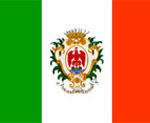The Italian parliamentarians [Senators Angela Maravento (Northern League), Enrico Pianetta (People of Freedom), Raffaaele Fantutti (Mixed Group) and deputies Gianni Farina (Democratic Party), Teresio Delfino (Pdl), Guglielmo Picchi (Pdl) Antonio Razzi (Italy of Values)] wanted to show the “cousins’” attachment to this historical event: the “annexation” of the County of Nice to France following the agreements of the Treaty of Turin and the referendum in which the people of Nice, with almost all the votes, expressed their support for joining the French Empire.
This was, as former Italian Ambassador to Paris, Luigi Guidobono Cavalchini, told us during his conference last Friday at the CUM, the victory of the principle of nationalities over the geopolitical interest of states through the use of referendums as a means of expressing their will. A principle that the Kingdom of Piedmont and Sardinia applied in its favor during the referendums that allowed the creation of the Kingdom of Italy and which made the King’s Minister, Count Camillo Benso di Cavour, its political “maker.”
The Italian Consulate was the scene of an official ceremony during which, in a convivial atmosphere with the presence of representatives of the Italian community residing in Nice, Consul General Mr. Chiesa Alciator and Honorary President Gianni Farina addressed words of friendship to the French representative of the National Assembly and the Mayor’s Office of Nice, Rudy Salles.
There remains the curiosity of knowing the reason why the official term “reunion,” as it can be read in the text of the Treaty of Turin of March 24, 1860, became “annexation,” even though the meanings of the two words are not really the same.
This mystery is compounded by a second one: the PACA Region Hotel in Marseille was displaying these days a huge banner with the inscription: “1860-2010: Reunion of Nice to Provence.” Here too there is considerable doubt: In Nice, they celebrate the “annexation to France” while in Marseille, they celebrate the “reunion to Provence.” Errors? Different interpretations? Historical truths and falsehoods?
For the record, even Rudy Salles could not enlighten us on this subject… Who then has the right answer?


